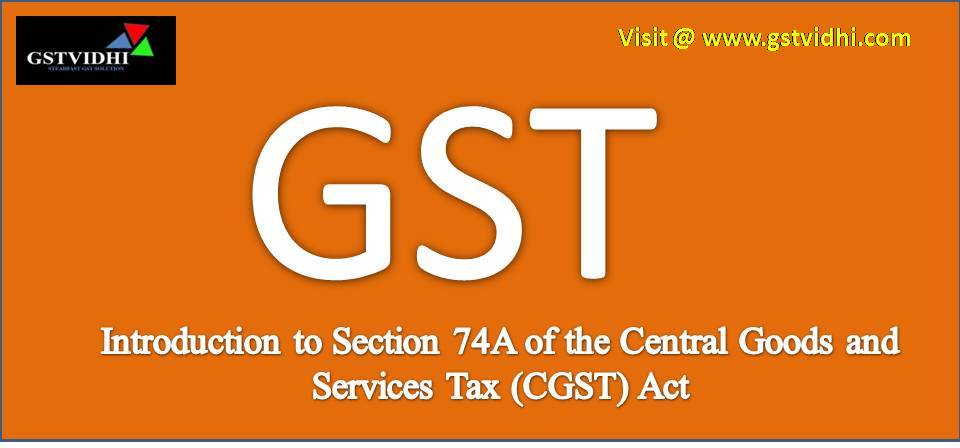
Introduction to Section 74A of the Central Goods and Services Tax
(CGST) Act
Section 74A is a
significant addition to the CGST Act, which aims to streamline the process of
addressing unpaid or short-paid taxes, erroneous refunds, and wrongly availed
or utilized input tax credits (ITC) from the financial year 2024-25 onwards.
This section is designed to ensure compliance and penalize discrepancies,
providing clear guidelines for both taxpayers and tax authorities.
Key
Features of Section 74A:
1. Notice Issuance:
·
If a proper officer finds that tax has not
been paid, has been short-paid, has been erroneously refunded, or ITC has been
wrongly availed or utilized, they must issue a notice to the taxpayer.
·
This notice asks the taxpayer to explain
why they should not pay the amount mentioned, including interest and any
applicable penalties.
2. Threshold for Issuing
Notice:
·
No notice will be issued if the unpaid
tax, short-paid tax, erroneous refund, or wrongly availed ITC in a financial
year is less than ₹1,000.
3. Timeframe for Notice
Issuance:
·
The proper officer must issue the notice
within 42 months from the due date for furnishing the annual return for the
relevant financial year or from the date of the erroneous refund.
4. Subsequent Statements:
·
If necessary, the proper officer can serve
additional statements detailing further discrepancies for periods not covered
in the initial notice. These statements are considered part of the original
notice.
Penalty
Provisions Under Section 74A:
1. Non-Fraudulent Cases:
·
If the discrepancy is not due to fraud,
willful misstatement, or suppression of facts, the penalty will be 10% of the
tax due or ₹10,000, whichever is higher.
2. Fraudulent Cases:
·
If the discrepancy is due to fraud,
willful misstatement, or suppression of facts, the penalty will be equal to the
tax due.
Process for
Issuing Orders:
1. Order Issuance:
·
After considering any representation from
the taxpayer, the proper officer will determine the amount of tax, interest,
and penalty due and issue an order.
·
This order must be issued within 12 months
from the date of the notice. If there are delays, a senior officer can extend
this period by up to six months.
Options for
Taxpayers to Rectify Errors:
1. Before Notice Issuance:
·
If a taxpayer realizes an error before
receiving a notice, they can pay the due amount along with interest and inform
the proper officer in writing. If this is done, no notice or penalty will be
issued.
2. After Notice Issuance:
·
If a taxpayer pays the due amount along
with interest within 60 days of receiving a notice, no penalty will be levied,
and the proceedings will be concluded.
3. Fraudulent Cases:
·
In cases of fraud or willful misstatement,
the taxpayer can pay the tax, interest, and a penalty of 15% before the notice
to avoid further proceedings.
·
If paid within 60 days of the notice, a
25% penalty is applicable. After the order, a 50% penalty must be paid within
60 days to conclude proceedings.
Additional
Provisions:
1. Shortfall in Payment:
· If
the proper officer believes the amount paid by the taxpayer is less than the
amount actually due, they can issue a notice for the shortfall.
2. Penalties for
Self-Assessed Taxes:
· Penalties
apply if any self-assessed tax or collected tax is not paid within 30 days from
the due date.
Applicability:
· The
provisions of Section 74A are applicable for the determination of tax from the
financial year 2024-25 onwards.
Explanations:
1. Proceedings Exclusion:
· All
proceedings in respect of the said notice" do not include proceedings
under Section 132, which deals with offenses and penalties.
2. Definition of
Suppression:
· Suppression"
means not declaring required facts or information in returns, statements,
reports, or other documents, or failing to provide information requested in
writing by the proper officer.
Conclusion:
Section
74A is an important addition to the CGST Act, aimed at ensuring compliance and
addressing discrepancies in tax payments and ITC utilization. By providing
clear guidelines for notice issuance, penalties, and rectification processes,
this section helps both taxpayers and tax authorities maintain transparency and
accountability in the GST regime. This new section is expected to streamline
tax administration and enhance the efficiency of the GST system, starting from
the financial year 2024-25.
Disclaimer: All the
Information is based on the notification, circular and order issued by the
Govt. authority and judgement delivered by the court or the
authority information is strictly for educational purposes and on the
basis of our best understanding of laws & not binding on anyone.
Click here